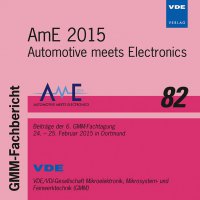Lifetime of Electronic Control Units with Increased Designed Operating Time
Konferenz: AmE 2015 – Automotive meets Electronics - Beiträge der 6. GMM-Fachtagung
24.02.2015 - 25.02.2015 in Dortmund, Deutschland
Tagungsband: AmE 2015 – Automotive meets Electronics
Seiten: 6Sprache: EnglischTyp: PDF
Persönliche VDE-Mitglieder erhalten auf diesen Artikel 10% Rabatt
Autoren:
Youssef, Abdalla; Birner, Ingo; Völkel, Holger (BMW AG, Munich, Germany)
Youssef, Abdalla; Middendorf, Andreas; Lang, Klaus-Dieter (Technische Universität Berlin, Forschungsschwerpunkt Technologien der Mikroperipherik, Berlin, Germany)
Inhalt:
Electronic control units (ECUs) in automotive industry are embedded micro-electronic systems controlling a system or a sub-system in a motor vehicle. These systems are exposed to extreme harsh electrical and physical working conditions. Moreover, due to the continuous innovation in automotive industry, complexity and miniaturization of these systems are increasing. Consequently, the reliability of these systems is a very important topic for OEM’s. Reliability as a definition is the ability of the device to perform its designed function in terms of years of useful lifetime. Accelerated testing is used to obtain reliability information by visualizing the possible failure mechanisms during the useful lifetime relatively quick compared to the actual lifetime in field. Systems are subjected to more severe stress levels than those specified in the normal operating conditions. The accelerated test results can then be extrapolated to the operating conditions in order to get information about the device useful life. However, the failure mode at the accelerated level should be identical to the failure mode at the normal conditions level. One of the mostly used accelerated testing models is Arrhenius model used for high temperature operating endurance test. In this model, testing time is a function of temperature and activation energy. The maximum possible temperature that may be tolerated by the ECU could be used in order to increase the acceleration factor. However, this model is challenged with several issues. One of these issues is the assigned activation energy value. Due to the exponential relationship, the calculated acceleration factor is very sensitive to the activation energy. Therefore, care should be considered in assigning the appropriate activation energy value representing the most potential failure mechanism in order to prevent misleading results represented in over-estimated testing time or underestimated testing time. Nowadays, due to the existence of electromobility concept, the lifetime of some electronic control units are increased, represented in driving time in addition to charging time. Consequently, the accelerated qualification time has also increased which is cost and time consuming. Therefore, a scientific approach is required in order to reduce the testing time of qualifying electronic control units without reducing the reliability level.


